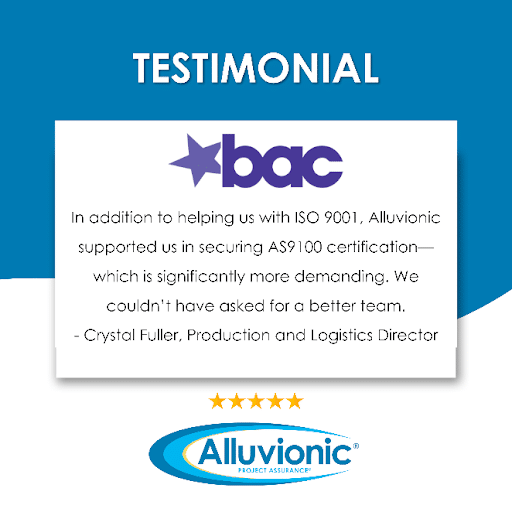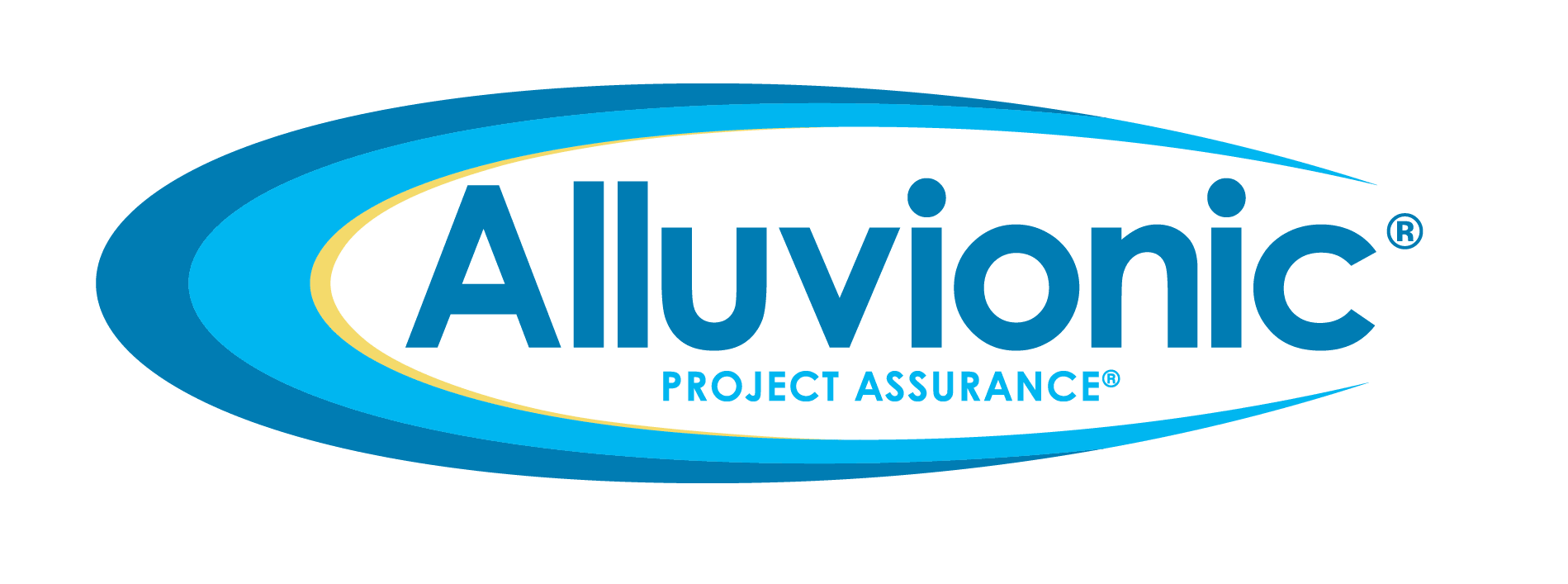Home » ISO 9001 Implementation Services
ISO 9001 Implementation Services
What Businesses Should Know About Closing Gaps and Building Lasting Quality Systems
- ISO 9001 implementation turns standards into practical, lasting quality systems.
- Implementation helps businesses close gaps, align teams, and sustain compliance.
- Core steps include:
- Gap analysis to identify weaknesses
- Baseline and action planning with timelines and responsibilities
- Implementation support: process updates, documentation, training, and internal audits
- Readiness checks and audit preparation
- Ongoing maintenance to stay compliant between audits
- Working with an expert partner ensures clarity, efficiency, consistency, and sustainability.
- Organizational change management ensures staff embrace and follow new quality practices.
- Example: Brevard Achievement Center successfully transformed its QMS with Alluvionic’s guidance.
- Implementation services deliver more than certification—they build operational capability and a culture of quality.
Start your journey to lasting compliance today.
From Standards to Action: ISO 9001 Implementation
ISO 9001 is an international standard that outlines the requirements for a quality management system (QMS). At its core, it’s about helping organizations create structured, reliable processes that meet customer needs, comply with regulations, and foster continuous improvement.
But knowing the standard and putting it into practice are two very different things. That’s where ISO 9001 implementation services come in. These services help organizations translate abstract requirements into real-world changes—adjusting workflows, updating documentation, and ensuring teams are aligned with quality goals.

Why Implementation Services Matter
Even companies committed to quality can find the ISO 9001 journey challenging. The standard expects a coordinated approach across departments, often requiring new procedures, internal audits, and training. Without support, organizations may struggle with:
- Interpreting the standard’s language and expectations. For instance, ISO’s requirement for “controlled conditions” might be unclear until translated into practical steps like standardized work instructions and equipment calibration logs.
- Identifying existing process gaps. A company might believe it tracks quality well, only to discover during a gap analysis that it lacks formal documentation for corrective actions or measurable objectives.
- Creating the documentation needed for certification. A business may need to formalize unwritten practices into documents like a Quality Manual, training records, and internal audit reports to meet ISO requirements.
- Sustaining practices long-term, especially between audits. Without ongoing attention, routines like management reviews and internal audits can fade; regular check-ins or lightweight support can help maintain compliance year-round.
That’s why many businesses, especially small to mid-sized firms and government contractors, turn to implementation partners for help.
What ISO 9001 Implementation Typically Includes
Implementation services are designed to walk a business through every phase of becoming ISO 9001 compliant. Here’s what’s typically involved:
- Gap Analysis
The process begins with a detailed review of your current quality management system—or what exists of it. This includes evaluating procedures, records, training, and how customer requirements are handled. The goal is to pinpoint where you fall short of ISO 9001 expectations. - Baseline and Action Planning
Once gaps are identified, the next step is to establish a starting point. A plan is then created to close those gaps. This includes timelines, responsible parties, risk management strategies, and communication approaches.

- Implementation Support
This is where change happens. Policies are rewritten, procedures clarified, training conducted, and internal audits prepared. The work is typically guided by someone well-versed in ISO—often a certified expert who helps ensure your new systems are both compliant and practical. - Readiness Checks and Audit Prep
Before submitting for certification, organizations often conduct internal audits or “health checks.” These simulate the certification process and identify lingering issues. It’s a chance to refine before being formally assessed. - Ongoing Maintenance
ISO 9001 certification is valid for three years, but maintaining it requires continuous effort. Implementation partners may provide support after certification to ensure practices don’t lapse—especially important for staying ready between recertification audits.
The Benefits of Working with an Expert Implementation Partner
While some organizations can handle ISO 9001 implementation internally, most benefit from external guidance especially when resources are limited or the process feels overwhelming.
Working with a partner like Alluvionic offers:
- Clarity: Standards can be dense. A trained expert breaks them down into actionable steps.
- Efficiency: Proven tools and templates reduce the learning curve and prevent rework.
- Consistency: Implementation is aligned with long-term goals, not just short-term compliance.
- Sustainability: Focus is placed not only on passing the audit but maintaining the system over time.
At Alluvionic, we support this through certified ISO professionals, tailored project planning, and continued system maintenance—not just for certification, but to help organizations build a foundation for better decision-making and long-term performance.

Supporting Organizational Change
Perhaps most critically, effective ISO 9001 implementation isn’t just about systems—it’s about people. Documentation and process changes only work when they’re understood and embraced by the teams using them.
This is where organizational change management plays a vital role. Training, communication, and leadership support ensure that quality practices aren’t just written—they’re lived. Partners with experience in change management help guide organizations through this cultural shift in a way that’s collaborative and sustainable.
A Practical Example: Quality Transformation at BAC

Brevard Achievement Center (BAC), a nonprofit supporting individuals with disabilities, partnered with Alluvionic to achieve ISO 9001:2015 and AS9100 certifications.
Starting with a detailed gap analysis, Alluvionic helped BAC formalize informal practices, implement a structured quality management system, and train staff across all levels. The tailored approach included process mapping, documentation, and internal audits, culminating in
successful certification.
Beyond compliance, BAC gained a stronger culture of quality and the capability to maintain and grow their system independently—transforming a complex requirement into a catalyst for
operational improvement.
Final Thoughts: Making the Most of Implementation Services
Whether you’re preparing for your first ISO 9001 certification or looking to rebuild a QMS that’s fallen out of compliance, implementation services can be a key part of your quality strategy.
Choosing a thoughtful, experienced partner ensures that your investment in ISO 9001 yields not just a certificate, but real operational improvements. For many organizations, that’s the real value—streamlined processes, better decisions, and a reputation for quality that earns trust.
To learn more about how this fits into broader business improvements, you can explore Alluvionic’s process improvement offerings including ISO and CMMI overviews.
Read The Latest Process IMprovement NEWS

Why a Project Manager is Essential for Successful ERP Implementation
The Role of a Project Manager in ERP Implementation Implementing an ERP (Enterprise Resource Planning) system is no small feat. ERP systems integrate core business functions, from finance and operations

Making Change Work for Real Teams
Change. That little word that sparks excitement in leadership meetings and fear in just about everyone else. That’s where Organizational Change Management (OCM) comes in. More than just a buzzword,

How BAC Achieved ISO 9001 and AS9100 Certification with Alluvionic’s Support
Brevard Achievement Center (BAC), a nonprofit that helps people with disabilities through job training, employment, and community programs, wanted to improve how they work and grow their business by earning
